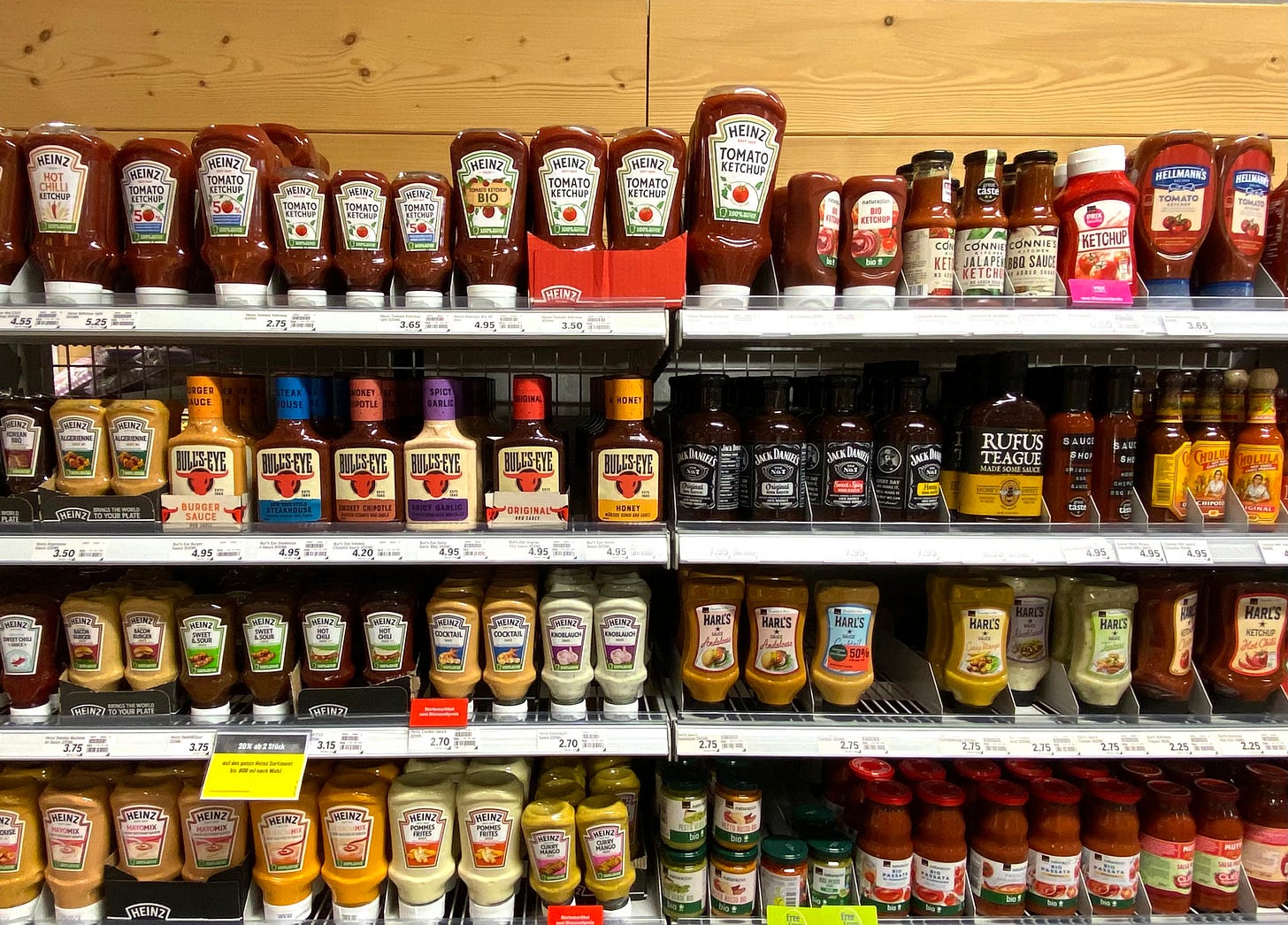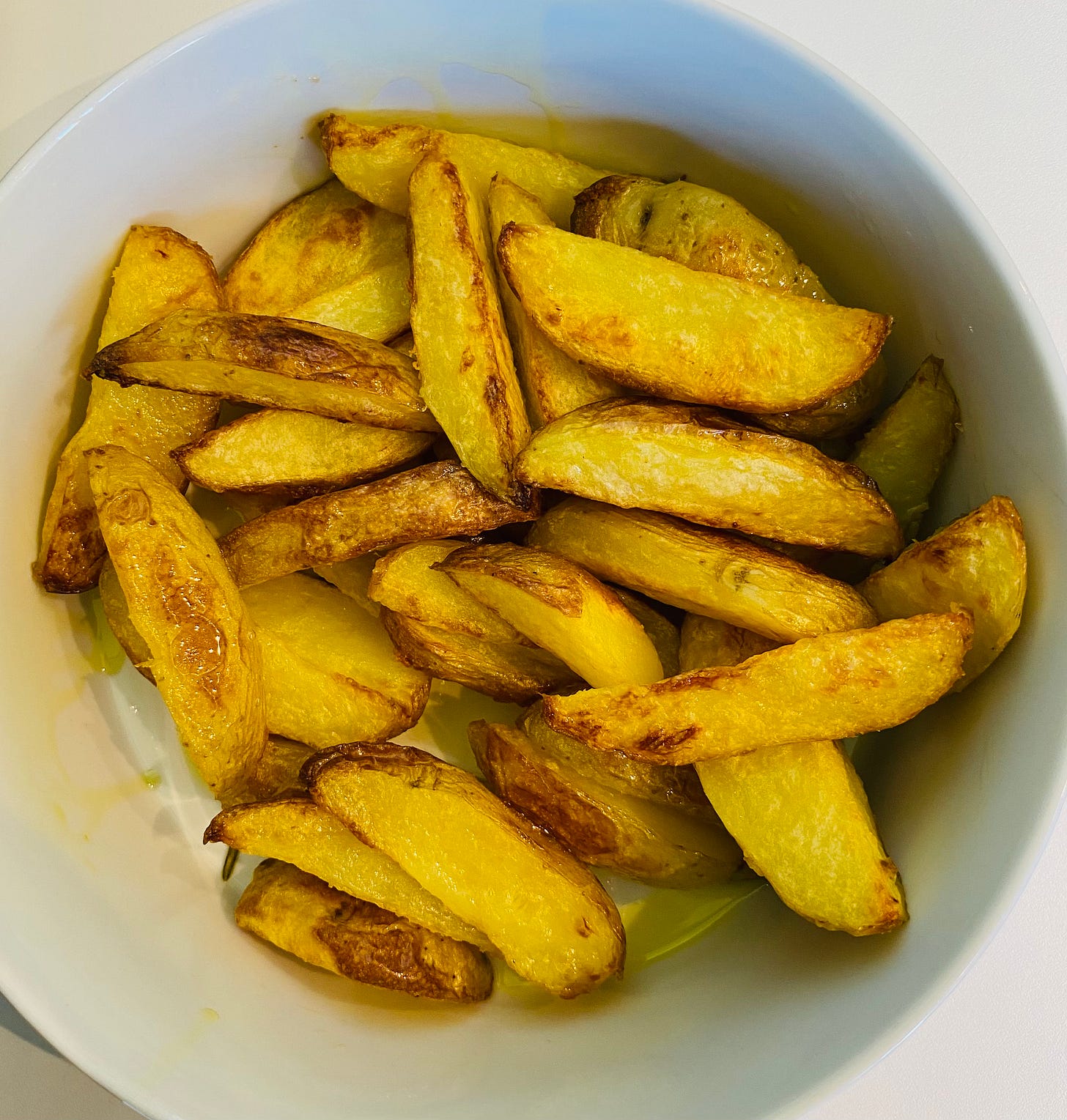I am one of those benighted souls who eats fries with mayonnaise instead of ketchup. My grossed-out family will point out that mayo is full of fat, and fries are full of fat too. To which I reply, “Exactly!” My preference for mayo over ketchup is not because I have gone native; in spite of snooty comments in travel forums about Americans’ allegedly déclassé fondness for ketchup, Europeans like ketchup too.

Anyway, since I’m not a fan of ketchup (it is too sweet for me), I will temporarily hand this post over to my daughter, Casey, who loves ketchup with a variety of foods—not just burgers and fries, but also fried chicken and fish, scrambled eggs, and even (as a child) pickles. Casey has kindly allowed me to share her Ketchup Manifesto1 (her term) with you all.
Ketchup Is Like Dinosaurs
Take it away, Casey!
I don’t know why everyone makes fun of adults who eat “nice” food (in other words, not fries and burgers, but things like steak) with ketchup. First of all, why do you care so much about what people eat?
But second of all, ketchup isn’t actually an unrefined food. It is a sauce that contributes sourness, sweetness, and umami, which is optimal for cutting through fatty, salty foods like steak. Far from simplifying food’s flavor palette, it adds additional complexity. It’s a lot like a balsamic reduction or wine sauce in that regard. Both those foods are considered fancy, but for some reason ketchup isn’t?
The only thing that makes ketchup “not fancy” is that it comes prepared (except you can probably buy prepared balsamic reduction or wine sauce at Whole Foods too) and that kids like it. But you know what kids also like? Dinosaurs.

Are you gonna call a paleontologist childish for studying dinosaurs just because kids also like them? No! So don’t do the same to ketchup.
It’s not childish for adults to like ketchup; it’s adultish for kids to enjoy it.
Thanks, Casey! And now for . . .
A Brief Digression about Dinosaurs
My son, Noah, is a young adult who loves dinosaurs.
I asked him why dinosaurs are cool, and here is his answer:2
You don’t need me to tell you why dinosaurs are interesting, or worthy of study, or so much more than just the monsters in a movie for children. Everyone has felt it—the sense of wonder as you look up at a fossil of a Tyrannosaurus, with its teeth the size of a hand, or an Ankylosaurus, armed with a hammer formed out of bone to break the bodies of hunters, or a Diplodocus, rearing above us higher than any of us will ever see any thing or anyone reach in the world today. You know, looking up at these, that there’s something innately magnificent about all of them, and you entertain the impossible dream that they can someday be more than fossils to us.
But there’s so much more than these big names to discover in the 125 million years of the Mesozoic, each just as fascinating. Island chains where flying reptiles as big as giraffes ate small dinosaurs whole, shark-toothed hunters designed to bring down the biggest animals of all time, reptiles surviving even on frozen tundras with thick coats of feathers—these are just some of the worlds I’ve found through my continued fascination with the dinosaurs.
Thanks, Noah! We now return to ketchup:
Ketchup Is a Smoothie
This heading comes from an amusing Reddit thread (h/t Casey). As the commenter points out, tomatoes are a fruit, and to make ketchup, you purée them and mix them with other ingredients. See? A smoothie!3
I had a lot of fun this week going down a ketchup rabbit hole (to mix a metaphor) online. Here is some of what I learned about ketchup:4
The earliest mention of ketchup-like sauces dates back to 300BCE. These first ketchups were made from fish entrails and soybeans, and because they were fermented, they were safe to eat throughout long voyages.
In the seventeenth and eighteenth centuries, British traders encountered ketchups in Asia and brought the idea for a savory, fermented sauce back home. To replicate the umami of Asian ketchups, the British made their own versions based on oysters, anchovies, walnuts, celery, peaches, or mushrooms.
Jane Austen loved mushroom ketchup!
In 1812, the American horticulturist James Mease made a great contribution to the world: He made ketchup from tomatoes (which he referred to as “love apples”).
Before Henry J. Heinz (yes, that Heinz) learned to preserve ketchup with vinegar, ketchup was preserved with coal tar and other poisonous substances.
Ketchup is a non-Newtonian fluid; its viscosity is not constant. Ketchup flows at the rate of .028 miles per hour. A snail, by comparison, races along at .03 miles per hour.
We Americans really love ketchup—we eat an average of ten billion ounces per year!5
C. K. Dexter Haven, You Have Unsuspected Depth!
This heading is one of my favorite lines from one of my favorite movies, The Philadelphia Story. (The line is at 1:42, but I highly recommend watching the whole scene. I promise you’ll be glad you did.)
Macaulay “Mike” Connor (James Stewart) had been assuming that C. K. Dexter Haven (Cary Grant) was just a dumb rich guy. Then Mike discovers his own short-story collection on Dexter’s bookshelf. So the joke is that when Mike says Dexter has “unsuspected depth,” he’s really complimenting himself more than Dexter.
Joking aside, I think “unsuspected depth” is a useful concept for us to keep in mind. Like Mike, we are prone to misunderestimate other people and their pursuits. We sometimes assume that if we’re not personally interested in something, then it must not be worthy of interest. We may disdain hobbies as mindless entertainment when they actually require intellectual engagement (for example video games, fantasy football, and—as I was sad to see last week in a contemptuous online comment—knitting).

We may sneer at adults who enjoy genre or YA fiction, when we haven’t read the books ourselves to see if there could be more to them than we think. And, as Casey and Noah note, we sometimes look down on foods and interests that we associate with childhood, not realizing that we can learn a lot from our kids. The Ketchup Manifesto is a plea to keep an open mind about activities, interests, and tastes we might otherwise dismiss. Who knows? We might discover we like them too!
How about you, readers? What is something you enjoy that people think is dumb or childish, but that in fact has unsuspected depth? Please share your thoughts in the comments!
The Tidbit
As a child, I was a picky eater and disliked fries. That mealy texture and the greasy residue they left on the roof of my mouth—blech! It wasn’t until I was a teenager and tried fries at a restaurant that I realized that I actually loved fries, just not the frozen kind from the grocery store.
I am happy to report that the tyranny of grocery-store fries is over. It is possible to make delicious homemade fries without splattering grease all over our kitchens or having to invest in a deep-fryer. The following recipe uses a technique for getting fries really crispy in the oven, which I learned from J. Kenji López-Alt’s excellent recipe The Best Crispy Roast Potatoes Ever. This recipe serves two ravenous people (with leftovers for the next day) or four people who are eating reasonable portions. Multiply the quantities as needed to accommodate your guests’ appetites.
Crispy Oven French Fries
Ingredients
6 fist-sized potatoes (I use Celtiane, but Yukon Gold also works well)
1T salt
1/4tsp baking soda
1/4c olive oil
1 large garlic clove, thinly sliced
1 or 2 sprigs of fresh rosemary
More salt! More happy, happy salt!
Method
Preheat the oven to 410F/210C and heat a big pot of water to a rolling boil.
Meanwhile, cut the unpeeled potatoes lengthwise into fry-shaped wedges—about 6 to 8 wedges per potato.
In a separate pot, heat the olive oil, sliced garlic, and rosemary sprigs together until the garlic begins to sizzle and turn a bit golden. Don’t let the garlic burn! Remove from heat.
When the water is boiling, add the salt and the baking soda. Then, carefully slip the potatoes into the water. (This is the only potentially messy part of the recipe. I always splash water everywhere. If readers have a good way of neatly getting potatoes into a boiling pot, please let me know!)
Bring the water back to a boil and then cook the potatoes for 9 or 10 minutes. Be sure to time it! If you boil the potatoes too long, the fries will be mushy. Drain the potatoes.
Dump the potatoes into a large bowl (or, to save having to wash another dish, just use the pot, off the heat) and pour the oil over. Salt liberally and toss to coat the potatoes evenly.
Line a baking sheet with parchment paper and evenly arrange the potatoes on the sheet peel-side-down. (Discard the garlic and rosemary.) Bake for 25–35 minutes. Keep an eye on the fries: When they are golden-brown, they are done.
Serve with ketchup. Or, you know, mayonnaise.
When I mentioned the title of this essay to my husband, he immediately intoned, “A spectre is haunting Europe—the spectre of ketchup.”
Noah originally included a riff on the badass way that the Carcharondotosaurus killed sauropods, but he (correctly) decided that it would be too gruesome for a family essay.
The commenter—who strikes me as a waggish type—also notes that “a mocha soy latte is a three bean soup. (Cacao, soy, coffee.)”
Huh. I converted this figure to metric for my non-American readers and discovered that 10 billion ounces is about 300 million liters, or an average of about one liter of ketchup per person in the US per year. That doesn’t actually seem like all that much when you put it that way.






My "unsuspected depth" story: I have a "serious amateur" band that plays both songs I write and a diversity of covers, and the other members are considerably younger than me. Our electric guitarist/banjo-ist Emma is 29. She loves the '70s pop hits of Steve Miller, and I have always regarded those tunes as lightweight and a bit silly. So I might've scoffed a bit when she first suggested playing "The Joker".
But we did try it, and it was fantastic. That song is so much fun. Afterwards, I reflected on how I take music very seriously, and I tend to separate songs into ones with emotional depth vs. ones that seem to flit above the landscape, lacking weight, emotional complexity, edginess, etc. I always found the former category much more interesting and enjoyable to play. More "authentic", I guess.
I realized that I was missing something that Emma understood: good music for a band is music that is joyful for the band to perform. A song has a heart and a soul, like a living thing. Look for that in music, instead of only appreciating the music that speaks to me directly. I feel like a light went on for me in that moment, and it forever changed the way I think about the music we play and even the songs I write.
Slip potatoes in the pot: spider.